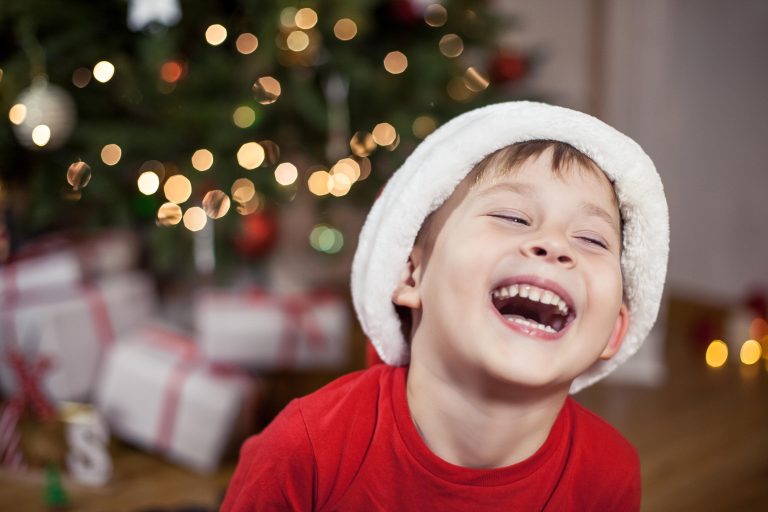Nothing spreads Christmas cheer quite like the sound of children’s laughter echoing through the house during the holiday season.
Christmas jokes for kids provide the perfect way to create joyful moments, break up long car rides to visit relatives, and bring smiles to family gatherings while celebrating the fun and wonder of the holidays.
Great kid-friendly Christmas humor often becomes part of family traditions, with favorite jokes being told year after year and passed down through generations. These moments of shared laughter create lasting memories while teaching children that holidays are times for joy, silliness, and bringing happiness to others.
Planning holiday gatherings or want to keep the family entertained during Christmas celebrations?
Create a gift list for your holiday festivities and coordinate with family to ensure your celebrations are filled with laughter, joy, and everything needed for perfect seasonal fun.
Santa Claus Jokes That Kids Love
Santa jokes are perennial favorites with children because they combine the beloved figure of Santa with silly wordplay that kids find endlessly entertaining.
Classic Santa Silliness
What do you call Santa when he stops moving? Santa Pause! Simple word substitution jokes like this are perfect for younger children who are just learning to understand humor.
How does Santa keep his suits so clean? He uses Santa-tizer! Modern references that kids can relate to make classic characters feel current and relevant.
Why doesn’t Santa ever get sick? Because he has elf care! This joke works on multiple levels, teaching kids about puns while using familiar concepts they understand.
Santa’s Helpers and Workshop
What do you call an elf who can sing? A wrapper! This joke helps children understand wordplay while being silly enough to make them giggle.
Why was Santa’s helper sad? He had low elf-esteem! These puns teach kids about word substitution while using concepts they’re beginning to understand.
What do you call a grumpy and short-tempered elf? A rebel without a Claus! Slightly more sophisticated wordplay that older kids appreciate while still being accessible to younger ones.
Santa’s Christmas Eve Adventures
Why does Santa go down chimneys? Because it soots him! These jokes often involve familiar Christmas concepts with unexpected twists that surprise and delight children.
What does Santa say when he’s backing up his sleigh? Ho… ho… ho..! Repetitive, familiar sounds that children find naturally funny and easy to remember.
Reindeer and Animal Christmas Jokes
Animal jokes resonate strongly with children who naturally love animals and enjoy imagining Christmas creatures in silly situations.
Rudolph and Friends
What do reindeer say before they tell a joke? This one will sleigh you! Animal puns are particularly popular with children who enjoy the combination of familiar animals with funny wordplay.
Why did Rudolph get bad grades? Because he went down in history! This classic joke combines familiar Christmas stories with school concepts kids understand.
What do you call a reindeer with no eyes? No-eye-deer! Simple wordplay that sounds like “no idea” creates the kind of silly confusion children love.
Other Christmas Animals
What do you call a cat on Christmas morning? Sandy Claws! Substituting animal characteristics for Santa’s name creates unexpected and amusing combinations.
What do you call a dog that works for Santa? Santa Paws! These simple substitutions are easy for children to remember and create themselves.
Why don’t elephants believe in Santa? They can’t fit down the chimney! Logic-based humor that children can follow while imagining silly scenarios.
What do you call a cow that delivers presents? Santa Moos! These animal sound substitutions never fail to get giggles from young children.
Christmas Tree and Decoration Jokes
Decoration jokes work well with children because they involve familiar objects they see throughout the holiday season in their own homes and communities.
Christmas Tree Humor
What did the Christmas tree say to the ornament? Quit hanging around! Personifying inanimate objects in ways that relate to their physical characteristics helps kids understand metaphor and wordplay.
Why are Christmas trees bad at knitting? They always drop their needles! Connecting tree characteristics to human activities in unexpected ways creates the kind of silly scenarios children love.
What’s a Christmas tree’s favorite candy? Orna-mints! Combining decoration names with similar-sounding words teaches kids about sound patterns and word creation.
Light and Ornament Jokes
Why did the Christmas lights go to school? To get brighter! Simple cause-and-effect humor that connects to concepts kids understand about learning and improvement.
What do you call a Christmas ornament that can do magic? A decoration wizard! Adding unexpected elements to familiar objects sparks children’s imagination.
Why don’t Christmas lights ever get lost? Because they always stick together! Observational humor about how Christmas lights behave that kids can relate to from experience.

Present and Gift Jokes
Gift-related jokes are perfect for Christmas morning or any time children are thinking about presents, making them especially relevant during the holiday season.
Wrapping and Unwrapping Fun
What do you call a present that’s good at math? A gift that adds up! Connecting presents to school subjects helps kids relate jokes to their daily experiences.
Why did the present go to school? To get more ribbon knowledge! Playing with words that sound similar while involving familiar concepts about learning and education.
What do you call a sleeping present? A present tense! Grammar-based humor that works for school-age children learning about language while being silly enough for all kids.
Gift-Giving Silliness
What’s the best thing about Switzerland at Christmas? I don’t know, but the flag is a big plus! Visual and verbal puns that work on multiple levels while teaching kids about different types of humor.
Why don’t presents ever feel cold? Because they’re all wrapped up! Connecting the physical reality of wrapped gifts to emotional concepts in ways children find amusing.
What do you call a gift that tells jokes? A present comedian! Combining familiar concepts in unexpected ways encourages kids to think creatively about everyday objects.
Food and Treat Christmas Jokes
Food jokes work particularly well with children because they involve familiar treats and meals that are central to their holiday experience.
Christmas Cookie Comedy
What do you call a cookie that doesn’t want to be eaten? A smart cookie! Playing with familiar expressions while involving treats kids love creates immediate connection and understanding.
Why did the gingerbread man go to the doctor? He felt crumbly! Personifying treats while connecting to familiar experiences, like feeling sick, helps kids relate to the humor.
What’s a cookie’s favorite music? Crumb and bass! Musical puns that older kids appreciate while being silly enough for younger children to enjoy the sound patterns.
Holiday Meal Humor
What sound does a turkey’s phone make? Wing wing! Connecting animal characteristics to modern technology in ways that surprise and delight children.
Why did the cranberry turn red? Because it saw the turkey dressing! Color-change humor that involves familiar holiday foods while creating silly scenarios kids can visualize.
What do you call a turkey the day after Christmas? Lucky! Dark humor that’s still appropriate for children while teaching them about different perspectives on familiar situations.
According to child psychology research, food-related humor helps children develop positive associations with family gathering times while supporting language development through wordplay.
Winter and Snow Jokes
Winter-themed jokes celebrate the seasonal aspects of Christmas while including weather and activities that many children experience during the holidays.
Snowman Silliness
What do you call a snowman with a six-pack? An abdominal snowman! Body humor that kids find naturally funny while teaching them about wordplay and puns.
Why don’t snowmen ever get hot? They’re always chilling! Temperature-related humor that helps kids understand contrasts while involving familiar winter concepts.
What did the snowman say to the other snowman? Do you smell carrots? Connecting snowman construction to familiar smells in ways that create amusing scenarios.
Cold Weather Comedy
What do you call a penguin in the desert? Lost! Simple logic-based humor that helps children think about animal habitats while creating funny mental images.
Why do polar bears have fur coats? Because they’d look silly in leather jackets! Absurd visual humor that encourages kids to imagine ridiculous scenarios.
What’s an icicle’s favorite type of music? Something cool! Playing with temperature words and their slang meanings in ways kids can understand.
Interactive Christmas Jokes for Kids
Some jokes work best when children can participate, making them perfect for family gatherings and group entertainment.
Knock-Knock Christmas Fun
Knock knock! Who’s there? Holly. Holly who? Holly-days are here again! An Interactive format that children enjoy participating in while learning about timing and delivery.
Knock knock! Who’s there? Snow. Snow who? Snow use asking, I’m not telling! These participatory jokes help children practice conversation patterns while being silly.
Knock knock! Who’s there? Interrupting Santa. Interrupting San— HO HO HO! Surprise elements that break expectations in ways children find hilarious.
Question and Answer Games
What’s red and white and goes up and down? Santa in an elevator! Visual humor that helps children practice creating mental images while solving simple riddles.
What do you get when you cross a snowman with a vampire? Frostbite! Combining familiar concepts in unexpected ways that encourage creative thinking.

Age-Appropriate Christmas Humor
Different Christmas jokes work better for different age groups, allowing you to tailor humor to your audience while ensuring everyone can participate and understand.
For Younger Children (Ages 3-6)
Focus on simple wordplay, familiar sounds, and repetitive elements that young children can understand and remember easily. Animal sounds, rhyming, and basic puns work best for this age group.
For School-Age Children (Ages 7-10)
More complex wordplay, spelling-based humor, and jokes involving school concepts appeal to this age group while maintaining Christmas themes and family-appropriate content.
For Older Kids and Tweens (Ages 11+)
Slightly more sophisticated humor, cultural references they understand, and wordplay that requires more advanced language skills while still maintaining wholesome, family-friendly content.
According to developmental psychology research, children’s humor comprehension develops alongside their language skills, making age-appropriate joke selection important for ensuring all children can participate and enjoy shared humor experiences.
Using Christmas Jokes in Holiday Activities
Christmas jokes can enhance various holiday activities and traditions while creating opportunities for shared laughter throughout the season.
During Long Car Rides
Jokes help pass the time during holiday travel while keeping children entertained and engaged without requiring screens or additional materials.
While Waiting for Christmas Morning
Sharing jokes can help manage excitement and anticipation while creating fun distractions during the buildup to Christmas morning gift opening.
During Family Gatherings
Jokes provide easy entertainment that includes children in adult conversations while helping shy kids feel comfortable participating in group activities.
While Doing Holiday Crafts
Sharing jokes while working on Christmas projects keeps children engaged and happy while creating positive associations with holiday preparation activities.
Creating Christmas Joke Traditions
Many families develop special joke-telling traditions that become anticipated parts of their holiday celebrations year after year.
Daily December Jokes
Some families share one new Christmas joke each day in December, building anticipation for Christmas while creating daily moments of shared laughter.
Christmas Morning Joke Exchange
Starting Christmas morning with jokes before opening presents can become a special family tradition that children look forward to and remember fondly.
Holiday Dinner Entertainment
Incorporating joke-telling into holiday meals gives children opportunities to contribute to family entertainment while keeping everyone engaged during longer dinner celebrations.
Making Holiday Gatherings More Joyful with MyRegistry
Christmas jokes become part of the overall atmosphere of holiday celebrations, contributing to positive memories and family bonding that children carry with them throughout their lives.
The best holiday gatherings balance structure and spontaneous fun, creating environments where children feel comfortable sharing jokes while adults encourage and appreciate their humor attempts.
Consider how joke-telling can become part of your family’s unique holiday traditions while creating opportunities for children to feel included and valued in family celebrations.
Remember that the goal is creating joy and connection rather than perfect joke delivery, so encourage children’s attempts at humor while focusing on shared laughter and fun.
Ready to make this Christmas the most joyful and laughter-filled celebration yet for your family?
Create your gift list today and coordinate with family members to ensure your holiday gatherings have everything needed for perfect seasonal celebrations filled with gifts, laughter, and unforgettable family memories.
Looking for more holiday entertainment and family celebration ideas?
Check out our inspiration boards for seasonal parties, family activities, and festive occasions that bring everyone together.


